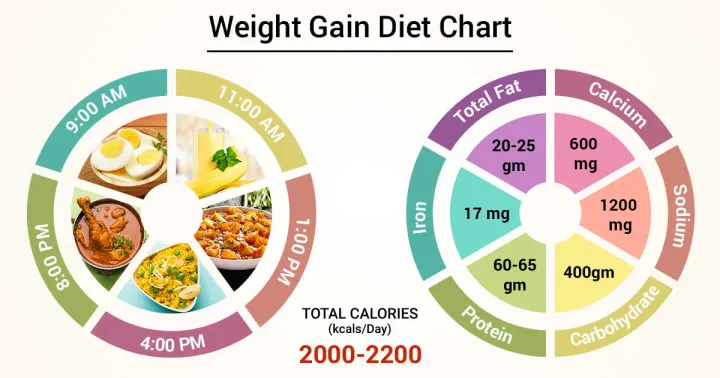Crafting an Effective Weight Gain Diet Plan: Building a Stronger, Healthier You
Introduction
While many people are on a quest to shed extra pounds and achieve a leaner physique, there are others who face a different challenge – gaining weight in a healthy and controlled manner. Whether you’re looking to build muscle, recover from an illness, or simply want to reach a healthier weight, a well-balanced weight gain diet plan is essential. This article will guide you through the process of creating a sustainable and effective weight-gain diet plan.

Understanding the Basics
Before embarking on a weight gain journey, it’s important to understand the key principles behind a successful weight gain diet:
- Caloric Surplus: To gain weight, you need to consume more calories than your body burns in a day. This surplus of calories will be used to build muscle and store energy as fat.
- Quality Calories: Not all calories are created equal. Prioritize nutrient-dense foods to support your overall health. Focus on lean proteins, complex carbohydrates, and healthy fats.
- Balanced Nutrition: A well-rounded diet should include proteins, carbohydrates, fats, vitamins, and minerals. Balancing these elements is crucial for optimal health and weight gain.
- Consistency: Consistency is the key to success. Stick to your weight gain plan to see tangible results over time.
Crafting Your Weight Gain Diet Plan
- Calculate Your Daily Caloric Needs: Start by determining how many calories you need to maintain your current weight (known as your Total Daily Energy Expenditure or TDEE). You can use online calculators to estimate your TDEE, and then add an additional 250-500 calories to create a caloric surplus.
- Prioritize Protein: Protein is essential for muscle growth and repair. Aim to include lean protein sources like chicken, turkey, fish, lean beef, eggs, and plant-based options like tofu and legumes in your diet.
- Complex Carbohydrates: Carbohydrates provide energy for your workouts and daily activities. Opt for complex carbs like whole grains, brown rice, quinoa, and sweet potatoes.
- Healthy Fats: Incorporate sources of healthy fats like avocados, nuts, seeds, and olive oil into your meals. These fats not only provide extra calories but also support overall health.
- Frequent Meals: Instead of sticking to the traditional three meals a day, consider eating smaller, more frequent meals to ensure a consistent intake of calories and nutrients.
- Snack Smartly: Healthy snacks can provide a boost in calories and nutrients. Snack on yogurt, trail mix, fruits, or a protein shake between meals.
- Stay Hydrated: Water is essential for overall health, so ensure you stay well-hydrated. But avoid drinking too much water during meals as it may fill you up and make it harder to consume enough food.
- Track Your Progress: Keep a food diary to monitor your daily intake and adjust your plan as needed. Tracking your meals can help you identify where you might fall short on calories or nutrients.
- Strength Training: Combine your diet plan with a consistent strength training routine. Resistance exercises will help you build muscle and direct the additional calories toward muscle growth rather than fat storage.
- Patience and Time: Weight gain should be gradual and sustainable. Don’t rush the process, and be patient with yourself. Set realistic goals and monitor your progress over time.
Potential Pitfalls to Avoid
While working on your weight gain diet plan, be cautious about:
- Relying on Junk Food: Gaining weight doesn’t give you a license to indulge in unhealthy, processed foods. Prioritize nutrient-rich options for long-term health.
- Skipping Meals: Skipping meals will make it harder to reach your calorie goals and may lead to muscle loss.
- Excessive Cardio: While cardio is beneficial for cardiovascular health, excessive aerobic exercise can burn off the extra calories you’re trying to consume. Focus on strength training instead.
you may also watch this short video
Conclusion
As due to climate change in Pakistan there are a lot of changes occurring in the diet. Creating a weight gain diet plan requires careful consideration of calorie intake, nutrient balance, and a commitment to a long-term, healthy approach. Be patient and consistent in your efforts, and remember that gaining weight in a controlled and healthy manner is just as important as losing it. Seek guidance from a healthcare professional or registered dietitian if needed to ensure your plan aligns with your specific goals and health requirements. With dedication and perseverance, you can achieve your weight gain objectives while promoting your overall well-being.
3 Responses
Thanks for sharing. I read many of your blog posts, cool, your blog is very good.
Thank you for your sharing. I am worried that I lack creative ideas. It is your article that makes me full of hope. Thank you. But, I have a question, can you help me?
Top 100 Searched Drugs.
where to buy generic lisinopril without rx
They have a great selection of wellness products.